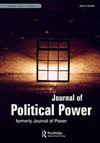The democratizing qualities of the Palestinian village Bil’in’s civil resistance campaign
IF 1.3
Q1 POLITICAL SCIENCE
引用次数: 1
Abstract
This paper deals with the quality of civil resistance and, in particular, the democratizing qualities of various civil resistance practices. There is a great amount of research on civil resistance and its capacities to foster social change, and in particular its impact on increased democracy. However, we still have an empirical bias in this research since these studies mainly focus on mass-mobilized breaking resistance. This paper provides an analysis of various civil resistance practices’ democratizing qualities based on a case study – namely the Palestinian village Bil’in’s campaign against the Israeli plans to build a ‘security barrier’‚ through the village’s farmlands. The process of the campaign began in 2002 and lasted until the Supreme Court of Israel’s decision from 2007 to re-route the building of the ‘security barrier’ away from the farmland from was implemented in 2011. Based on a ‘process tracing’ (PT) methodology, an analysis of, primarily, interviews that were made with Bil’in activists and proxy activists (mainly Israelis) is presented, where the tracing underlying mechanisms could explain why the campaign had an impact on democracy. Theoretically, the paper applies the concept of ‘democratizing qualities’ (Munck 2016), as well as the analytical toolbox that is labelled the ABC of civil resistance. The paper will conclude with a presentation of potential causal mechanisms that may explain why the civil resistance campaign impacted on democracy. The guiding overarching research question is: In what ways can different practices of civil resistance have democratizing qualities?巴勒斯坦村庄比尔因的民间抵抗运动的民主化特质
本文讨论了公民抵抗的性质,特别是各种公民抵抗实践的民主化性质。关于公民抵抗及其促进社会变革的能力,特别是其对加强民主的影响,有大量的研究。然而,由于这些研究主要集中在大规模动员的断裂阻力上,因此我们在本研究中仍然存在经验偏差。本文基于一个案例分析了各种公民抵抗实践的民主化性质——即巴勒斯坦村庄Bil ' in反对以色列计划通过该村的农田建立“安全屏障”的运动。这场运动始于2002年,一直持续到以色列最高法院于2007年做出决定,将“安全屏障”的建设路线从农田转移到2011年。基于“过程追踪”(PT)方法,本文主要分析了对比尔因活动家和代理活动家(主要是以色列人)的访谈,其中追踪的潜在机制可以解释为什么运动对民主产生了影响。从理论上讲,本文应用了“民主化品质”的概念(Munck 2016),以及被标记为公民抵抗ABC的分析工具箱。本文最后将介绍可能解释为什么民间抵抗运动影响民主的潜在因果机制。指导研究的首要问题是:不同的公民抵抗实践以何种方式具有民主化的品质?
本文章由计算机程序翻译,如有差异,请以英文原文为准。
求助全文
约1分钟内获得全文
求助全文

 求助内容:
求助内容: 应助结果提醒方式:
应助结果提醒方式:


